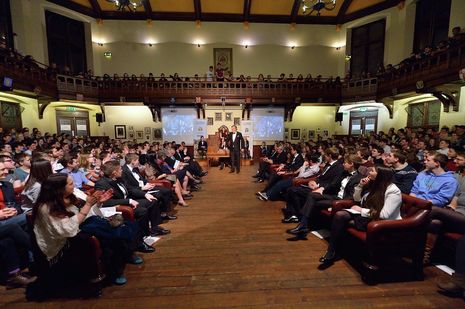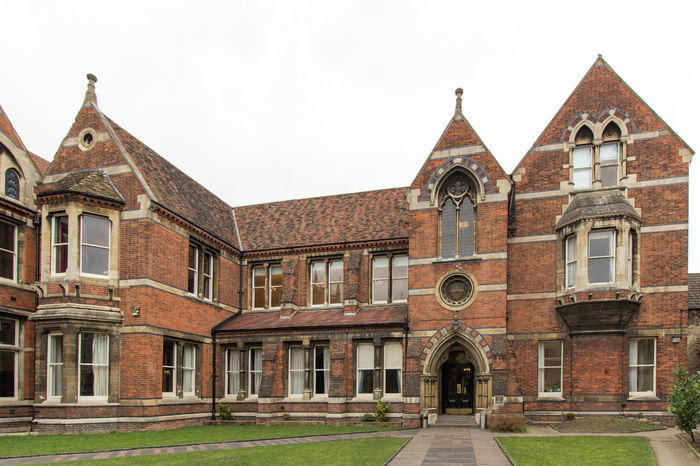The Cambridge Union’s lukewarm commitment to free speech
Hugh Jones offers his insight into the recent controversy surrounding Andrew Graham-Dixon’s speech at the Cambridge Union, arguing that the Union must fully restore its commitment to free speech

On Thursday, November 4, the Cambridge Union hosted a debate on the proposition, ‘there’s no such thing as good taste’. One of the invited speakers was noted art historian Andrew Graham-Dixon, who argued that good taste does in fact exist. To show this, he asserted that taste and morality are inexorably linked; thus, if there is no such thing as good taste, there is no such thing as morality, a conclusion Graham-Dixon claimed was unacceptable. To illustrate his point, Graham-Dixon gave an extended impression of Hitler, employing a ropey German accent, whilst offering Nazi talking points. As part of this impression, Graham-Dixon used language that today is almost universally regarded as racist and anti-Semitic.
“Protecting free speech out of fear is little better than abandoning it out of cowardice”
In response to the fallout from this speech, the Union sent an email to its members – including myself – on Monday, in which the President promised to ‘create a blacklist of speakers never to be invited back’, and to ‘intervene [in debates] if and when I feel it part of my duty to our members and audience to do so’. The President later U-turned on the proposed blacklist, but this incident nonetheless demonstrated that the oldest free speech society in the world has a remarkably lukewarm commitment to free speech.
Ironically for a group of master debaters, the Union’s mistake was to accept its opponent’s framing of the question. The Union implicitly accepted that hosting a speaker who uses racist language is itself racist. The problem with this is that the whole point of the Union is to act as a venue where important debates can take place, and having important debates requires having controversial speakers making controversial speeches. The Union cannot, as it briefly did here, accept moral responsibility for what the speakers say. If it did then this term the Union would have been both for and against the withdrawal of Western troops from Afghanistan, a staunch defender and bitter critic of the Obama years, and both a die-hard hedonist and a raging stoic.
The Union’s job is to foster vigorous debate, facilitating not only the expression of controversial views, but also rigorous scrutiny of them; it was obvious to anyone watching the debate on Thursday that the President wasn’t going to intervene, because that is not his job. Anyone in the room could have stood up and interrupted Graham-Dixon, that they chose not to is regrettable, but not the fault of the Union.
The Union’s leadership know all of this, of course. No one commits countless hours to running a free speech society – whilst simultaneously battling the tripos – without a fondness for free speech. Bradwell mentioned in his apology that he did not intervene because he ‘lack[ed] the courage to stop someone in front of a room of 400’. In truth, Bradwell lacked the courage to defend the Union’s commitment to free speech and debate, and has only – partially – rowed back his knee-jerk acquiescence to his critics in the face of even louder criticism from the national press. Protecting free speech out of fear is little better than abandoning it out of cowardice.
“Perversely, anti-racist activism can lead to the election of genuine racists”
Nowadays, one often hears the argument that people should not be able to express “bad” opinions, even in good faith, because bad political speech is a form of violence. Voicing opposition to gay marriage, for example, is thus unacceptable because doing so causes LGBT people distress. Until very recently I agreed with this, but the problem is that wishful thinking does not make the problems of prejudice and discrimination go away. Racism, antisemitism, and all the other evils with which Bradwell’s critics are so concerned are vile poisons which thrive in darkness and die in the light. Through its timidity, the Union temporarily joined a long line of high-profile liberal institutions which have abandoned their principles when faced with a vocal minority of woke activists who equate silencing opponents with winning debates.
The problem with this is that it fails to actually help the people whom these activists seek to empower. If you oppose homophobia, you should be urging the Union to have the most important and influential homophobe you can think of to come and speak, so that you and everyone else can show exactly why they are wrong. On an individual level, if you oppose homophobia, you should find the most homophobic person you know, get them to tell you exactly how and why they hate gay people, and then convince them why they are wrong. This may sound naïve, but it is far less so than simply assuming that everyone will agree with you if you shout loudly enough, and threaten those who disagree with you.
Perversely, anti-racist activism can lead to the election of genuine racists and until left-wing activists wake up to this, demagogic politicians will continue to channel growing backlash to win elections. When it comes to helping marginalised groups, the most important thing liberal institutions such as the Union can do is to restore their commitment to free speech, even if it leads to the occasional uncomfortable moment.
 News / SU reluctantly registers controversial women’s soc18 December 2025
News / SU reluctantly registers controversial women’s soc18 December 2025 Features / Should I stay or should I go? Cambridge students and alumni reflect on how their memories stay with them15 December 2025
Features / Should I stay or should I go? Cambridge students and alumni reflect on how their memories stay with them15 December 2025 News / Dons warn PM about Vet School closure16 December 2025
News / Dons warn PM about Vet School closure16 December 2025 News / Cambridge study finds students learn better with notes than AI13 December 2025
News / Cambridge study finds students learn better with notes than AI13 December 2025 News / CUP announces funding scheme for under-represented academics19 December 2025
News / CUP announces funding scheme for under-represented academics19 December 2025









